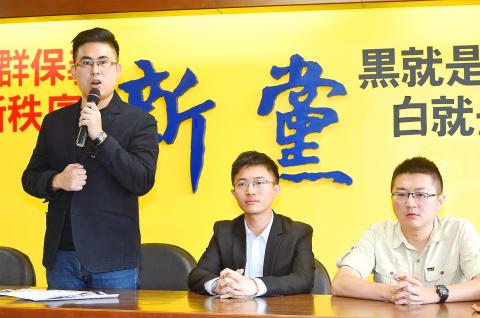New Party spokesman Wang Ping-chung (王炳忠), his father, and New Party youth wing executives Ho Han-ting (侯漢廷) and Lin Ming-cheng (林明正) were indicted yesterday after prosecutors said they found evidence of espionage and Chinese funding.
The three New Party defendants “had endangered national security and social stability by developing an organization for use by the Chinese government and its military” in contravention of the National Security Act (國家安全法), the Taipei District Prosecutors’ Office said.
Wang’s father, Wang Chin-pu (王進步), was charged with being an accessory to espionage and other illegal activities conducted by the other defendants.

Photo: Cheng Hung-ta, Taipei Times
Prosecutors said they uncovered evidence of money transfers from China to the three party members to work with convicted Chinese spy Zhou Hongxu (周泓旭) in his efforts to infiltrate Taiwan’s military and connect with Taiwanese politicians and youth organizations.
Zhou, a former graduate student at National Chengchi University, was Beijing’s liaison and was also responsible for monitoring progress and collecting reports made by Wang Ping-chung, Ho and Lin.
Zhou had set up a “Star Fire Secret Unit” and gave the four of them code names: Wang Ping-chung was “One,” Lin was “Two,” Ho was “Three” and Zhou was “Four,” the prosecution statement said.
Nine retired and active military officials were contacted to obtain classified materials, most of whom reportedly had links to the nation’s weapons procurement programs, prosecutors said.
Documents belonging to Wang Ping-chung showed that he was already working with Chinese officials in 2013, before meeting Zhou, and had later written that officials from China’s Taiwan Affairs Office had promised to provide him and Zhou up to NT$16 million (US$535,296 at the current exchange rate) a year for their work in Taiwan, they said.
Prosecutors said they had uncovered Wang Ping-chung’s accounting ledgers that showed money transfers from Chinese sources, in addition to a work document on which Wang Ping-chung wrote: “[I will] work under the guidance and assistance of the Chinese Communist Party to unite and integration the forces working to achieve unification across the Taiwan Strait.”
Wang Ping-chung allegedly cofounded the pro-unification Web site Fire News (燎原新聞網) with Zhou, which they used to recruit Taiwanese into their spy network.
The Taiwan High Court in April handed Zhou a 14-month prison sentence for attempting to recruit Taiwanese officials.
After the indictments were announced, Wang Ping-chung, Ho and Lin held a news conference in Taipei, at which Wang Ping-chung accused the prosecutors of “concocting a story” without any “smoking gun” evidence.
“If the judiciary has the guts, then I will ask for an open trial so that the public can see and judge for themselves,” he said.
Lin accused the administration of “adopting the ways of Adolf Hitler’s Nazi Party to crack down on dissidents.”

INVESTIGATION: The case is the latest instance of a DPP figure being implicated in an espionage network accused of allegedly leaking information to Chinese intelligence Democratic Progressive Party (DPP) member Ho Jen-chieh (何仁傑) was detained and held incommunicado yesterday on suspicion of spying for China during his tenure as assistant to then-minister of foreign affairs Joseph Wu (吳釗燮). The Taipei District Prosecutors’ Office said Ho was implicated during its investigation into alleged spying activities by former Presidential Office consultant Wu Shang-yu (吳尚雨). Prosecutors said there is reason to believe Ho breached the National Security Act (國家安全法) by leaking classified Ministry of Foreign Affairs information to Chinese intelligence. Following interrogation, prosecutors petitioned the Taipei District Court to detain Ho, citing concerns over potential collusion or tampering of evidence. The

Seventy percent of middle and elementary schools now conduct English classes entirely in English, the Ministry of Education said, as it encourages schools nationwide to adopt this practice Minister of Education (MOE) Cheng Ying-yao (鄭英耀) is scheduled to present a report on the government’s bilingual education policy to the Legislative Yuan’s Education and Culture Committee today. The report would outline strategies aimed at expanding access to education, reducing regional disparities and improving talent cultivation. Implementation of bilingual education policies has varied across local governments, occasionally drawing public criticism. For example, some schools have required teachers of non-English subjects to pass English proficiency

‘FORM OF PROTEST’: The German Institute Taipei said it was ‘shocked’ to see Nazi symbolism used in connection with political aims as it condemned the incident Sung Chien-liang (宋建樑), who led efforts to recall Democratic Progressive Party (DPP) Legislator Lee Kun-cheng (李坤城), was released on bail of NT$80,000 yesterday amid an outcry over a Nazi armband he wore to questioning the night before. Sung arrived at the New Taipei City District Prosecutors’ Office for questioning in a recall petition forgery case on Tuesday night wearing a red armband bearing a swastika, carrying a copy of Adolf Hitler’s Mein Kampf and giving a Nazi salute. Sung left the building at 1:15am without the armband and apparently covering the book with a coat. This is a serious international scandal and Chinese

NEGOTIATIONS: The US response to the countermeasures and plans Taiwan presented has been positive, including boosting procurement and investment, the president said Taiwan is included in the first group for trade negotiations with the US, President William Lai (賴清德) said yesterday, as he seeks to shield Taiwanese exporters from a 32 percent tariff. In Washington, US Trade Representative Jamieson Greer said in an interview on Fox News on Thursday that he would speak to his Taiwanese and Israeli counterparts yesterday about tariffs after holding a long discussion with the Vietnamese earlier. US President Donald Trump on Wednesday postponed punishing levies on multiple trade partners, including Taiwan, for three months after trillions of US dollars were wiped off global markets. He has maintained a 10 percent